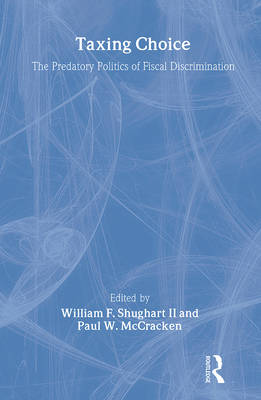
- Retrait gratuit dans votre magasin Club
- 7.000.000 titres dans notre catalogue
- Payer en toute sécurité
- Toujours un magasin près de chez vous
- Retrait gratuit dans votre magasin Club
- 7.000.0000 titres dans notre catalogue
- Payer en toute sécurité
- Toujours un magasin près de chez vous
38,45 €
+ 76 points
Format
Description
Taxing behavior deemed "politically incorrect" has long been a convenient way for politicians to fund programs benefiting special interest groups, to the public's disadvantage. Government policy toward various goods - drugs, tobacco and alcohol, for example - has been locked into a regulatory cycle of tax and taboo. Support for legalizing other substances is buttressed by the revenue-generating power of so-called "sin" taxesi And the products subjected to excise taxation have varied from soft drinks, fishing gear and margarine to airline tickets, telephone calls and gasoline. Taxing Choice thoroughly addresses the costs and benefits of these predatory public policies.Shughart notes that the record of such punitive selective taxation has been anything but successful, hindering economic progress and failing to deliver the promised social benefits. In addition, the costs of selective taxes fall disproportionately on lower-income people, while more politically powerful interest groups benefit. At the same time, such policies are a poor way to raise funding for public services, and foster political corruption and self-serving bureaucracies accountable to no one. Indeed, policies discriminating against certain products may represent ominous trends easily extended into virtually every facet of people's lives. One can envision policies proscribing foods, sun bathing, obesity, and even books, films, and political and religious beliefs deemed "dangerous."Part I is devoted to the political economy of selective taxation. Contributors trace the history and politics of selective excise taxes in the United States, discussing the range of products that have been subject to such taxation from the founding period to the present. Part II explains how these taxes emerge in a political marketplace with opposing pressure groups scrambling for wealth transfers in their own favor. Part III looks at taxes on specific products as well as such banning policies as Prohibition and the war on drugs. Constitutional, economic, and civil liberty issues, including civil asset forfeiture and product liability, are discussed in Part IV. With the accelerating national debate over tax reform and the downsizing of government, Taxing Choice is a timely and far-reaching contribution to a debate of great interest to economists, policymakers, historians, sociologists, and taxpayers in general.
Spécifications
Parties prenantes
- Auteur(s) :
- Editeur:
Contenu
- Nombre de pages :
- 412
- Langue:
- Anglais
- Collection :
Caractéristiques
- EAN:
- 9781560009313
- Date de parution :
- 31-01-97
- Format:
- Livre broché
- Format numérique:
- Trade paperback (VS)
- Dimensions :
- 153 mm x 228 mm
- Poids :
- 553 g

Les avis
Nous publions uniquement les avis qui respectent les conditions requises. Consultez nos conditions pour les avis.






